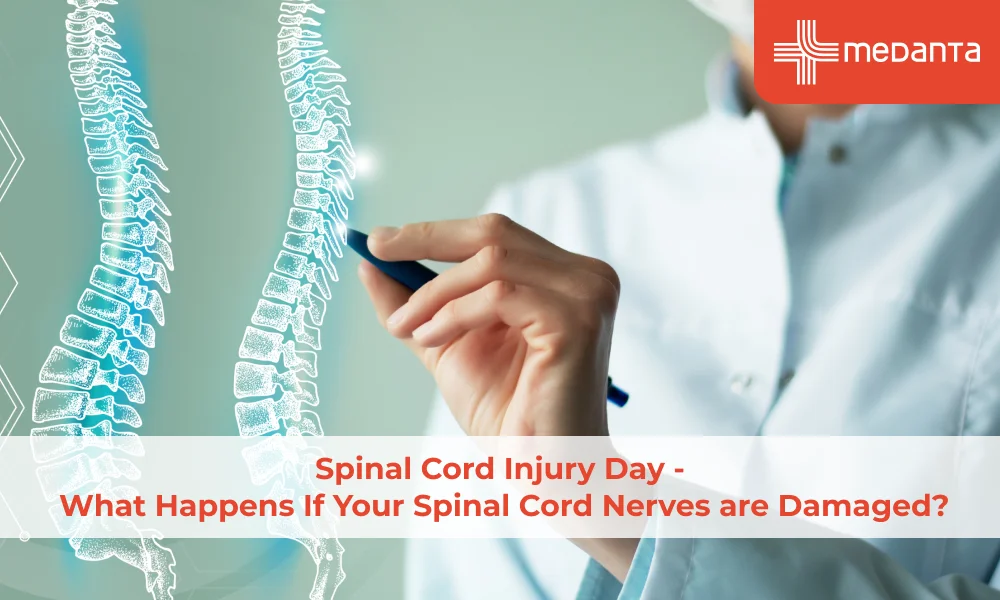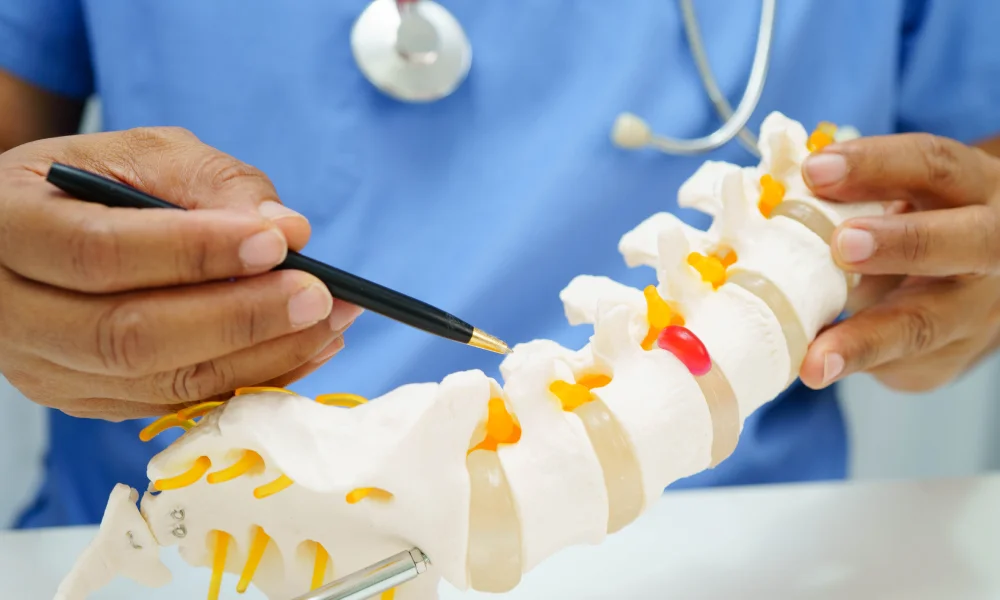Spinal Cord Injury Day - What Happens If Your Spinal Cord Nerves are Damaged?

TABLE OF CONTENTS
Spinal Cord Nerve Damage
The spinal cord and its nerves spread out towards the rest of the body and are extremely sensitive. So, when there is any damage or injury to the spinal cord and nerves, its effects are more than just pain based on the severity and area of the damage.
Whether you’ve acquired a spinal cord injury or nerve damage due to a traumatic accident or are experiencing recurrent pain, tingling, feeling of numbness, and weakness in your neck and back region; it is highly recommended you see a doctor specialising in spinal cord injuries at the earliest.
Any injury affecting your spinal cord and spinal nerves or gradual wear and tear can go on having permanent serious consequences if they’re not attended to in time.
Causes of Spinal Cord and Spinal Nerves Damage
Spinal nerves are the bundle of nerves that run from the base of the skull to the tailbone and low back. These are further protected by solid bones called as vertebrae that are also responsible for supporting the body and skeleton. Some common causes of damage to the spinal cord and nerves that flex out from the spine are:
Degenerative disc disease
Nerve compression
Herniated disc or disc bulge
Sports-related accidents and injuries
Motor vehicle accidents
Spinal stenosis
Consistently poor posture for long
Repetitive motions

Spinal Cord Injury Symptoms
The spinal cord is responsible for carrying electrical signals to and from the brain that control our body movements and functions. These functions include the functioning of the heart, voluntary hand and leg movements, and the sensation we feel when touching an object. So when the spinal cord and spinal nerves are damaged, these signals often get delayed or blocked with excruciating nerve pain.
Here are some common spinal cord injury symptoms:
Acute, excruciating pain
Loss of muscle function
Weakness
Numbness or loss of sensation while touching an object
Disturbed bowel movements and incontinence
Difficulty walking, moving, and getting up from a place
Loss of bladder and bowel control
Tingling, pin-like sensation in arms, legs, back, neck, hands, and feet
Effects of Spinal Cord & Spinal Nerve Damage on Body
Injuries to the spinal cord and spinal nerves can have an adverse effect on many body functions. These effects are explained in detail below:
Spinal Cord Reflexes
The spinal cord and spinal nerves are responsible for transmitting signals to and from the brain to the rest of the body. These signals lead to voluntary and involuntary movements and functions in the body. When the spinal cord gets damaged, the message from the brain can’t reach anywhere in the body. However, the spinal nerves below the injury site can receive the message but the same is unable to go up to the brain. There can be some resultant reflex movements but most of them are beyond control.
Spinal Shock
A spinal shock means a temporary loss of all spinal cord reflexes just below the injury site. This state of spinal shock can typically last from a few days to weeks and can’t be prevented. It gets resolved on its own. After the spinal shock is over, there is spasticity and stiffness below the spinal cord injury level.
Trouble Breathing
After your body has a spinal cord injury, the muscles responsible for normal breathing and coughing get weak. These muscles include the diaphragm, intercoastal, and abdominal ones. A person affected with a spinal cord injury will face trouble having normal breathing and will often be required to cough up to clear the lungs of any bacteria or secretions. If the person is unable to cough properly or clear the lungs of secretions, they may be at an increased risk of developing pneumonia.
Low Heart Rate & Low Blood Pressure (Neurogenic Shock)
It is the brain that normally controls blood pressure and regulates heart rate. Our brains send messages through the spinal cord to constrict blood vessels and elevate the heart rate to keep both blood pressure and heart rate in check. However, these brain signals get blocked after a spinal cord injury which may result in low blood pressure and slower heart rate.
Altered Temperature Regulation
It is the side effect of a spinal cord and nerve injury that an affected person can’t feel goosebumps or even sweat below the site of the injury. Such persons may experience extreme temperature changes within a short span. They may feel cold and need layers of blankets one moment and may feel hot, need a fan, or have an urge to uncover themselves the next moment.
Autonomic Hyperreflexia / Dysreflexia / Hyperdysreflexia
Those with a spinal cord injury above T6 are at a higher risk of getting autonomic hyperreflexia which happens after the spinal shock phase is over. This situation occurs as the movement of the nerve messages that used to go up to the brain via the spinal cord are now blocked.
People with autonomic hyperreflexia may face the conditions below the level of injury:
Full bladder
Either constipation or a full bowel
Infections
Skin breakdown
Pain
Ingrown toenail
Feeling of sudden temperature changes in the ambience
Symptoms of autonomic hyperreflexia include:
Anxiety
High blood pressure
Slow heart rate
Sweating above the injury level
Severe throbbing headache
Stuffed nose
Deep Vein Thrombosis (DVT)
Often caused by the lack of movement, DVT is a blood clot that forms between the legs or arms. On diagnosis, your doctor may recommend you wear elastic stockings, sequential compression devices, and foot pumps to be kept on your legs or feet to avoid a DVT situation. May immediately be put on a blood thinning medicine and will be advised to perform regular arms and leg exercises to prevent DVTs from occurring.
Excruciating Pain
You may experience acute or chronic pain after having a spinal cord injury. Acute pain could be the result of broken bones, surgery, bruises, or positioning. While, chronic pain can be caused due to changes in the joints, muscles, and ligaments and their overuse. Pain management after a spinal cord and nerve injury depends on the type and cause of the pain. Do speak to your doctor about efficient pain management.
Loss of Bladder & Bowel Control
Bowel control changes of complete loss of it are common after a spinal cord injury. The affected person may either experience diarrhoea or a constant feeling of constipation. Similarly, a spinal cord injury causes damage to the message transmission between the bladder and the brain. In normal situations, your brain receives a message from the bladder via the spinal cord of having a full bladder and the urge to urinate. This gets hampered after a spinal cord injury and the affected person loses control of their bladder movement.
Wrapping Up!
A spinal cord and nerve injury requires immediate medical attention and subsequent treatment by a qualified professional to avert its life-threatening complications and prevent the risk of long-term medical issues. While an injury can’t be averted, seeking timely help is in your control.






